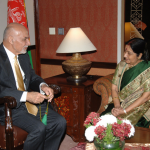At the ‘Heart of Asia’ conference in Islamabad on 9 December 2015, Indian Minister for External Affairs Sushma Swaraj reminded the audience about the historic links between India, Pakistan, and Afghanistan, and expressed New Delhi’s readiness to join the Afghanistan-Pakistan Trade and Transit Agreement (APTTA). She said greater connectivity with Afghanistan will help economic growth and aid South Asia’s integration.
Increased and easier South Asian connectivity, starting with a road network, has been one of the priorities of Prime Minister Narendra Modi, who has discussed with Afghan President Ashraf Ghani the merits of land links with India. Any overland route between Afghanistan and India via Pakistan would be cost effective and mutually beneficial. Easy access through Pakistan will enable Afghan goods to be trucked to India, and on the way back the trucks can carry goods from India to Afghanistan. That will increase official trade as well as reduce dependence on Dubai as a conduit (using the sea or air routes) for conducting business between the two countries.
India-Afghanistan bilateral trade in 2013-14 was worth $683 million[1] ($474 million of exports and $209 million imports by India). India is the second largest destination for Afghan exports, despite the lack of direct transit access. Clearly, the trade potential is tremendous, and for this a land route is critical.
While Afghanistan backs India’s entry into APTTA, Pakistan, a key player in Afghanistan’s politics, has been stridently opposed to India’s entry into what it believes is a bilateral agreement. Kabul understands the tremendous benefits to its economy and people if the land route to India is opened up, and the Afghan government has often asked that its trucks be allowed to travel to and from the Wagah border into India. But Pakistan has consistently turned down this request.
Instead, Pakistan has demanded Tajikistan’s entry into the agreement, which would open Central Asia to both New Delhi and Islamabad. This is largely a decision of the Pakistan military, which has a voice in policies that concern New Delhi. Pakistan believes that the access enabled by APTTA will give India a greater say in Afghanistan’s affairs and have security implications for Islamabad. Besides, access by road, Pakistan’s industry fears, might allow Indian goods to be smuggled in large quantities, thereby impacting business.
The growing differences between Pakistan and Afghanistan on the future of trade relations stem from rising political distrust in the last few months. Ghani, who has wooed Pakistan in the past and even made an unprecedented visit to its defence ministry in November 2014, in a turnaround in April 2015 made a trip to India and called for its inclusion in APTTA.
India’s eagerness to become a part of APTTA, evident at the ‘Heart of Asia’ conference, has added to Pakistan’s suspicions. Its officials have briefed local media about Islamabad’s reluctance to agree to Swaraj’s suggestion.
Although the Ghani government realises it has limited leverage with Pakistan on the APTTA issue due to Afghanistan’s land-locked position, after the recent conference the Afghan government managed to get Pakistan to agree to a review of APTTA in March 2016. To do so, it quoted rules that have governed the agreement since it was signed in 2010. In return, Afghanistan has conceded a long-standing demand to allow a one-year multiple entry visa for Pakistan’s businessmen.
Meanwhile, other options are being explored: a draft agreement between India, Iran, and Afghanistan to trade through Chabahar Port in the Persian Gulf has made substantial progress and awaits a last round of approvals before it is formally signed. Iranian President Hassan Rouhani and his government, in anticipation of a post-sanctions international regime, have invited India and China to invest in the Chabahar port’s infrastructure. Once the Chabahar-Afghanistan link is operationalised, it will provide an alternative to the land route through Pakistan.
For Pakistan, its demand to expand APTTA to include Tajikistan hinges on the potential that access to Central Asia offers. Undeterred by Kabul’s reluctance to give access through Tajikistan, Prime Minister Nawaz Sharif has announced that a motorway will connect Gwadar (a south-western port city in Pakistan) to Termez (a southern city in Uzbekistan); Termez lies between Uzbekistan, Afghanistan, Turkmenistan, and Tajikistan.
From Gwadar, this 650-kilometre road, which meets Chaman (near the Afghan-Pakistan border), will be completed by 2016. The route from Termez to Mazar-i-Sharif (in north Afghanistan) will go to Chaman via Kandahar in southern Afghanistan. A motorway from Peshawar (in northwest Pakistan) to Torkham (an Afghan border town) and then to Jalalabad (in east Afghanistan), is also under construction. It will connect with Kabul, Mazar-i-Sharif, and Termez.
Thereafter, Pakistan will have two routes to access Central Asia. Meanwhile, for India, it is entry into APTTA that holds tremendous potential—it will give New Delhi a greater say in Kabul’s politics while India helps rebuild Afghanistan’s economy. At the same time, it will bring Central Asia closer.
Such an inroad into APTTA is a part of the Modi government’s focus on increasing regional and economic connectivity as it seeks to link India with South East Asia, Central Asia, and China through land routes. However, given the role of army generals in Pakistan’s policies towards India, the Modi government’s desire to join APTTA might not fructify anytime soon.
Sunil Raman, a former BBC journalist, heads Public Affairs for Hill & Knowlton Strategies in India.
This article was exclusively written for Gateway House: Indian Council on Global Relations. You can read more exclusive content here.
For interview requests with the author, or for permission to republish, please contact outreach@gatewayhouse.in.
© Copyright 2016 Gateway House: Indian Council on Global Relations. All rights reserved. Any unauthorized copying or reproduction is strictly prohibited
References
[1] Ministry of External Affairs, Government of India, India – Afghanistan Relations, 20 July 2015, <http://www.mea.gov.in/Portal/ForeignRelation/Afghanistan_2015_07_20.pdf>


